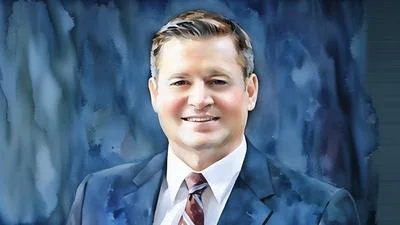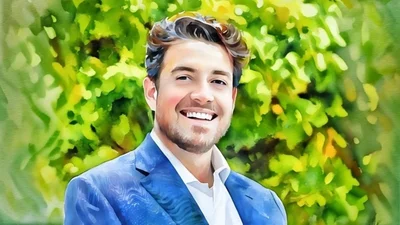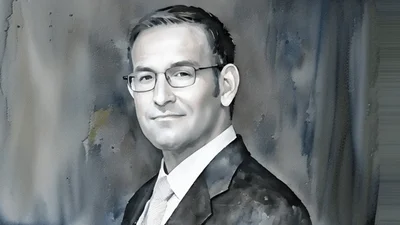Joe Kiani is the chairman, CEO, and co-founder of Masimo, a health-related company.
This transcript has been edited for length and clarity.
Federal Newswire: What was your first invention and your first patent?
Kiani: I think I've got 900 patent applications. I think 500 patents. A lot of people think it takes a genius to come up with inventive ideas. It doesn't. It just requires you to know enough about what I call the ‘four squares’ of a problem, and then you're trying to solve the problem. You come up with a solution to step out of that square.
My first invention was dealing with how you solve the motion artifact that causes false alarms with pulse oximeters. Pulse oximeters were these sensors you put on your finger, they shine light through the finger and they worked great. But if the person stood still, then the slightest motion would cause these devices to read off by 20, 30, 40% which was causing a lot of problems.
I had studied for my master's program under brilliant Professor Fred Harris. He taught me adaptive filters. This is back in the early 80s, and I thought I could use this adaptive filter to get rid of what we call ‘band noise,’ which is the noise of my motion, and the same as my heart rate. That was my first invention. It worked. I guess, as they say, the rest is history.
Federal Newswire: What does your company, Masimo, do?
Kiani: I started Masimo in my garage in 1989. I was 24. I got started young. I was 15 when I started college. I got my masters by the time I was 22.
I took out a second loan on my condominium, and with $40,000, I started Masimo with the hope and the dream that I could make it. Pulse oximetry is reliable and accurate enough so that it could really work for clinicians, and it could help babies be monitored at home. It could one day help protect people from opioid overdose.
Federal Newswire: What are your products, and how do you work with hospitals and medical groups?
Kiani: Well, we revolutionized pulse oximetry. We then made pulse oximeters as accurate and reliable [as possible]. Before that invention, 70-90% of the alarms were false alarms, [affecting] babies in an ICU [and] people found dead in beds because they were moving and the post-surgical ward had given them opioids.
We are now the leaders in pulse oximetry. The US primarily uses Masimo, but over 200 million patients are monitored with our pulse oximeter technology every year. We have taken that and moved on. We are serial innovators.
We invented what now we call pulse oximetry. Instead of just oxygen, we have this new 12 LED technology called ‘rainbow’ that helps us measure hemoglobin, carbon monoxide, seal poisoning. We also took AI and applied it to hospital automation to help clinicians figure out problems for their patients before it's too late.
Finally, tala monitoring. During Covid, we were helping hospitals send patients with Covid home if they didn't require ICU care to remotely monitor them. It was a lifesaver. Studies showed it reduced mortality by 70% and saved $11,000 a patient.
That's the four major pieces of technology that we have. We’re now a $2 billion publicly-traded company, and there's still a lot more to come.
Federal Newswire: Explain how your technology helps children and babies?
Kiani: When we started Masimo, my vision was to make a pulse oximeter so reliable it could go home with parents to monitor their babies for SIDS (sudden infant death syndrome). It could help hospitals monitor patients for opioids. But clinicians came up with their own inventions on how to use our technology.
Doctor Augusto Sola, who is the head of Neonatology at Cedars, said, “I think retinopathy prematurity happens because these pulse oximeters are under-reading. When the babies are wiggling and the clinicians increase the oxygen in the incubator in order to save their brain, it damages their eyes.” He was right.
Now that he had our technology, he showed that he could reduce retinopathy from 12% to zero. Two-thousand babies in America were going blind every year. Now this technology has been out in the NICUs for over 20 years. Now 40,000 people aren't blind. We talk about 350,000 years of eyesight that we've provided, and virtually eliminated [this cause of blindness] thanks to our accurate pulse oximeters.
Federal Newswire: How are you dealing with the opioid crisis?
Kiani: That was one of the things I really thought we could help because I knew pulse oximeters, if they could work reliably on people that weren't still because they weren't anesthetized, it could help tell people when they're about to die of opioid overdose. Because what happens? Opioids get rid of the pain.
When someone takes opioids and goes to sleep, they may never wake up because they'll stop breathing. When they stop breathing, oxygen saturation from our pulse customers will start dropping from 100 to 90, 80, 70. We can alarm and wake them.
We decided to take this technology that was being proven in hospitals to do just that. In fact, Dartmouth-Hitchcock did a 10-year study showing that nobody died, nobody had brain damage within the group that had the technology. But the group that didn't have our technology had deaths and brain damage.
By using our technology, they saved $7 million a year because they didn't send these patients back to the ICU as often. They didn't have to do rapid response team activation as often.
We took that hospital technology and we shrunk it, turned it into a wearable that you can put on your finger with a wrist strap with five-day battery life. It could then send your alarm to your phone or a hub.
We put it in the cloud. If you're having a desaturation event, it sends it to people who take care of you. If they don't respond, it sends it to the nearest ambulance with your location.
We just got FDA approval a year ago–the first of its kind. Nothing like this is out there. The FDA actually granted us breakthrough status, chose this as one of eight products out of 250 that could help the opioid epidemic. We hope to take 100,000 lives lost every year to opioids to zero with this technology. We call it ‘opioid halo.’
Federal Newswire: How will this work in the future?
Kiani: The future does look bright. We thank God. Humanity both comes up with and solves problems. Remember how people used to die until somebody invented soap? We're going to solve all these problems. That's why we are where we are.
I have to say, how it all comes together is with great people. I'm the average Joe that basically says persistence, persistence, persistence. That's what pays off. But the other thing I've always tried to do is hire people a lot better than me in every area; engineering, sales, marketing, manufacturing, finance.
Great companies make great products, and have a great sales force selling the products. Having this passion for helping patients has really given me the blessing of bringing some incredible team members in from all walks of life that help make it happen.
Federal Newswire: How are you so comfortable with letting others bring success to your company?
Kiani: You can't do it by yourself. We've seen great bands break up, and they're not as good as they used to be when they were together.
I look for purists. What do I mean by that? I look for people who love what they do, and the money is secondary to them. I just have to make sure I'm taking care of them. They really are passionate about what they do, whether it's engineering science, sales, finance, or operations, you have to look for people who just love what they do.
Federal Newswire: How do you get the word out about your products?
Kiani: I think if you can get your core executive team to know what you're trying to do they can hopefully get the rest of the circle, sales, engineers, marketing, and manufacturing team to know what you're trying to do. Hopefully they'll get the world to know what you're trying to do. So it's really just just getting out the ripples, the rings of knowledge.
We're not just looking backwards. We feel like we know where we have to go. The vision is as clear as day to me for what has to get done, even though it's sometimes 10 to 15 years away from getting done.
The hardest job I have to do is to share the vision with my team so they get it, they understand it, and then they go make me look like a visionary instead of someone who's delusional.
Federal Newswire: What are the risks in entrepreneurship?
Kiani: Some people think taking risks is because you're looking for a big reward. I think taking risks helps you live.
Do we believe in risk taking as the basis of not just thriving but survival? Absolutely. Trust me, for the first seven years, I didn't take any vacation. I think I took two weekends other than when I got sick. Working from the morning to when I fell asleep, and walking away from deals that seemed wrong out of principle.
Every time I made moves out of principle, that ended up being the best thing for me and for what I was trying to do. So, I think risk-taking is not just something you should consider. It's required to survive.
Federal Newswire: What’s next for your company?
Kiani: We have really built this incredible team. It reminds me of the 1990s Bulls in Chicago. That's what we have on this team.
There's so much more we have to deliver that will not only help patients, but when we help patients, we help our stockholders. We have got to keep this incredible team together. It would be a shame if it disperses.
The next evolution in healthcare is the home. We need to give people the ability to better care for themselves at home.








